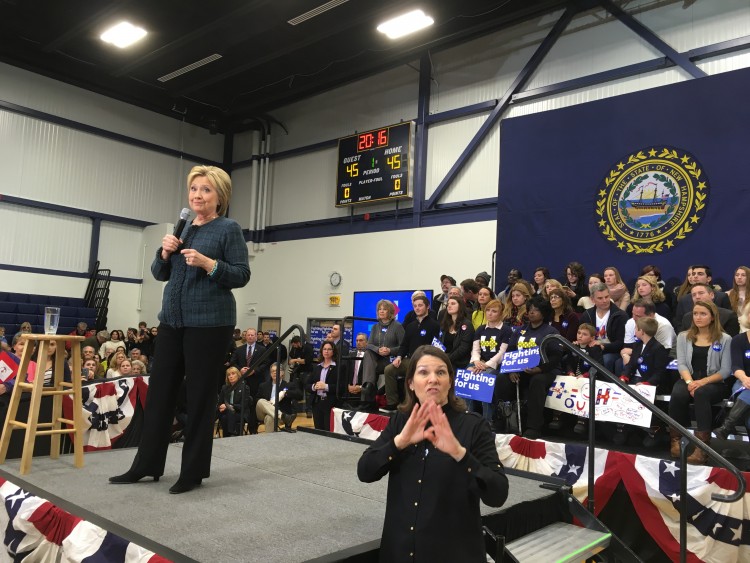To the Politicians Who Forget Voters With Disabilities Are the Largest Minority
by Ariella Barker and Joseph Batiano
At the age of 11, I lost the ability to walk. That same year, the Americans With Disabilities Act was passed, and I finally had the legal authority to fight for my rights. My public school and small rural town were inaccessible, but I fought to make the school and town ADA compliant by providing accessible bathrooms, curb cuts, ramps and elevators.
In my early years of being disabled, although I used a wheelchair, I was fully self-sufficient. I went to Emory’s business and law schools, moved to New York City to represent the City of New York and Mayor Bloomberg, and ultimately moved to Israel for several years. However, while in Israel, I became chronically ill. This forced me to move home to North Carolina with my family, be in and out of the hospital and ultimately go on disability.
Suddenly, I realized just how hard it is to be severely disabled in this country. Health care is a huge financial burden (even with ObamaCare) and long-term care, including personal care attendants, aren’t covered by insurance, which has forced me and millions of others to rely on aging family members to survive. We can’t get married without losing our benefits, and the list goes on.
People with disabilities comprise 20 percent of the population, and 52 percent of the population has a loved-one with a disability. The challenges we face range from the mundane to the shocking: 30 percent of us live in poverty, over 30 percent of jail and prison inmates have a disability, and over 80 percent of disabled women will be sexually assaulted at least once in our lifetimes. While appropriate policy could make a vast difference in our lives, our politicians largely ignore us. Even when discussing diversity, they usually leave out any mention of us or our issues.
This election season, we have heard Donald Trump openly mock us. His campaign has refused to answer RespectAbility’s questionnaire or attend any of their disability sponsored events. Hillary Clinton, however, included disability issues in every debate, platform speech, ad campaign and literature. So I soon became very involved in the Clinton campaign, fighting for the candidate who said she was going to fight for us, and against a candidate who was treating us as sub-human.
I became a HillRaiser, raising money for the campaign. I volunteered by writing social media posts about Hillary, focusing on disability issues. I wrote op-eds and blogs singing her praises. I constantly posted positive information about her and disability issues. I spent so much time and effort volunteering through research and writing that the disability committee offered to put me in a somewhat administrative position and interview me on their Facebook site, which I happily accepted.

Part of my volunteer work for Hillary was that every time someone messaged me with one nightmare story after another about the inaccessibility of her rallies or campaign offices, I bridged the gap with them to keep them in the fold. But I soon realized this was happening way too often.
Early on in my service with the campaign, I met J.J., a deaf father from Rhode Island who sent me the following letter:
“At the rally, I displayed my affection for Hillary with my shirt that said, “I’m With Her,” with a selfie of the two of us. My daughter, too, had a shirt with a selfie and a sign that said “Fighting for Us.” It was wonderful being in the presence of those who loved and believed in Hillary as much as I. But that heartwarming experience turned into heartbreak.”

He went on to say that a campaign staff member complained about the “optics” of having the interpreter in the screen shot, which, in her opinion, would be displeasing to the eye. As a result of this optics choice, the interpreter was forced to stand behind the barricade, creating a potentially unsafe situation for her. J.J. was unable to see the interpreter or understand anything Clinton had to say. I couldn’t help but remember how it wasn’t so long ago that disabled people themselves were moved out of view because we were displeasing to the eye.
J.J. and I communicated with Clinton staffers, who promised him this would never happen again, and so he returned to donating and actively volunteering. But sadly, it did continue to happen to him three other times… and to me.
When news came out that Clinton and President Obama were coming to my hometown, Charlotte, North Carolina, I was elated. I emailed my campaign contact to ask if I could volunteer, but I heard nothing in response.
On Tuesday, I arrived right when doors opened at 1:00 p.m. and was one of the first to enter. Once I arrived to the stage, I was informed that the ADA section was full and that I would have to go to the back of a standing room location, oddly reminiscent of Rosa Parks. Before I could move there, that same volunteer permitted non-disabled people of color into the ADA section. In fact, the ADA section was completely filled with non-disabled supporters. I felt it was about the optics of showing “politically important” minorities, and that apparently didn’t include the disability community.
It was incredibly disheartening to be treated like a second-class citizen, especially because it was coming from a campaign that purported to be so inclusive of persons with disabilities. So just as J.J. had informed Clinton staffers about his exclusion, so did I.
A few non-disabled super volunteers apologized and promised to work on this issue in North Carolina in the future. But this is a nationwide issue. And, frankly, people with disabilities are tired of having non-disabled people speak for us and tell us how they’re fixing our issues. We want a seat at the table. We want the right to speak to a high-level staffer. We want a national and state Democratic disability caucus, just as the African-American, Latino and LGBT groups have their own national and state caucuses. J.J. just started one in Rhode Island, and I am in the process of starting one in North Carolina. We make up the largest minority in this country, and yet it often seems like no one is even aware. We deserve the right to participate in the political process just like everyone else.
So, to the politicians who think people with disabilities and our votes are insignificant: we make up 20 percent of your electorate. Don’t expect to gain our vote with lip service and empty promises. Show us that you recognize that without us, your campaigns are weaker. Don’t put us in the back of the room like second-class citizens or block us from seeing an ASL interpreter, and for heaven’s sake, don’t mock us. Like every other minority, you need us to strengthen your campaign. So, let us, indeed, be #StrongerTogether. Or else, come November, certain politicians will realize that without the disabled vote, they were weaker divided.

